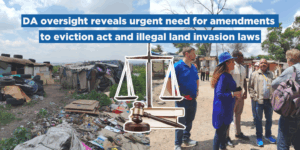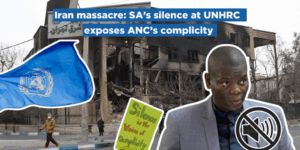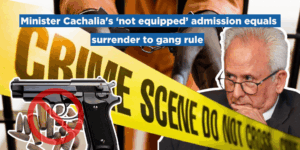The following speech will be delivered in Parliament’s Debate on South Africa’s deepening water crisis today
Speaker,
On 17 October this year, President Cyril Ramaphosa urged Southern African Development Community (SADC) member States to implement comprehensive multi-year response plans to tackle the recurrent droughts and food insecurity in order to boost agricultural production. This was at the 39th SADC Ordinary Summit of Heads of State and Government.
While this sentiment is welcomed, I need to ask the President, where is South Africa’s drought plan?
Last year, on 13 February 2018, our country was classified as a national drought disaster.
This reclassification of drought as a national disaster designated the primary responsibility for the coordination and management of the disaster to the National Executive, who must act in close cooperation with the other spheres of government to deal with the disaster and its consequences.
Minister Zweli Mkhize, at that time, said that three provinces including Western Cape, some parts of the Northern Cape and Eastern Cape are extremely affected, and are not yet showing comforting signs of improvement.
That was 18 months ago.
Die situasie het intussen vererger en steeds is die ANC regering “missing in action”. Of nee, die Adjunk President het oor die Noord-Kaap gevlieg en gese die droogte is baie erg en kort onmiddelike reaksie.
Droogtes is ‘n normale reëlmatige verskynsel van ons klimaat. Ons weet almal dat Suid-Afrika ‘n droë land is en dat klimaatsverandering ons negatief beïnvloed.
Klimaatsverandering kan seker nie as ‘n ramp gesien word nie maar die uitwerking hiervan met ondergemiddelde reënval oor langer as ses jaar sowel as gepaardgaande rekordhoë temperature is ‘n huidige werklikheid en het ons land se boere op hul knieë gedwing.
Water is lewe en sonder water is daar dood. Geen mens, dier of plant kan oorleef as daar nie water is. Mense in dorpe en stede word direk geraak wanneer daar nie meer ‘n druppel water uit hul krane kom. Duisende mense in plattelandse gebiede drink egter nog water uit strome en riviere. Wanneer hierdie water opdroog raak die oorlewingstryd onmenslik.
The crippling effect on our agricultural sector is devastating. Not only do they have no income during this time but it cost billions to keep animals alive.
Do you have any idea how difficult it is to decide which animals you will feed and which once you will leave to die?
This is a choice that our farmers make on a daily basis, most of them just don’t have the funds to keep on buying feed anymore.
And it is not only our livestock farmers that are affected, grain and crop farmers struggled trough below rainfall years during 2013, 2015, 2016 and 2019. It has placed many farmers in massive debt and they cannot get further credit from the banks. The agricultural debt is growing yearly and is currently around R190 billion.
We would like to thank the Western Cape Minister of Agriculture, Dr Ivan Meyer, who has been instrumental in ensuring drought support to farmers and farmworkers of the Western Cape over the past 3 years. Not only is funding provided to buy feed and help keep workers employed, much needed funding is also going into support for counselling. We have seen farmers committing suicide during this time and emotional support is welcomed.
We also recognise the efforts of the Eastern Cape who has now gazetted drought in the province.
Thanks must also go out to all the groups who raise funds to assist with fodder and drilling of boreholes. This has been ongoing over the past four years and has kept many farmers and families alive.
But where is our National Government? And where is our National Drought Plan?
The Democratic Alliance would like to repeat our call that the drought be declared a national disaster in order to ensure improvement of planning, management and response across various organs of state as well as sectoral roleplayers.
This drought affects more than one province and we cannot leave it up to provincial
governments to deal with this alone.
We urge Minister Thoko Didiza to convene an urgent agricultural MINMEC in order to discuss the impact of the drought and to shift funds from AgriParks towards drought relief. This could make at least R1 billion immediately available.
Minister Tito Mboweni, we call on you, to look at legislation regulating our banking sector in order to assist with soft loan repayments during such long disaster periods.
We support the call by AgriSA to look at a way of getting agricultural insurance that could assist during these periods.
But most of all, we call on the ANC government to find the political will to support farmers, black and white, during these difficult times.




